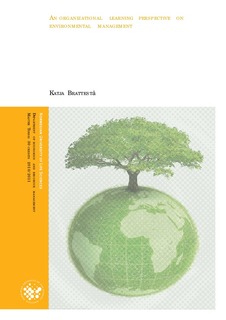| dc.description.abstract | Markets are creating tougher competition which increases the pressure on organizations to
learn and adapt, to be more proactive, and to change faster to stay ahead of competitors. Thus
the ability to learn is very important. The notion of the “learning organization” is recognition
of the importance to organizations of being able to respond rapidly and creatively to events
outside the firm’s boundaries. The challenge posed by the consequences that organizations
have on the natural environment are among the most difficult that the firm faces. Effective
strategies and responses demand that all of the firm’s knowledge resources are used. Pressure
from society implicitly makes the environment a part of the company’s strategy by forcing it
to adapt to social demands. The environmental achievements the learning organizations gain
are not necessarily rewarded and not proven by a certificate or mark. As evidence of their
commitment to environmental performance an increasing number of companies choose to get
an environmental certification, if only to satisfy demands from customers and society.
As the number of environmentally certified companies continue to grow it is relevant to look
at the effects and consequences this trend has on organizations’ ability to learn. This study
focuses on the ISO 14001 certification system, which has been criticized for several aspects
including being both a “one size fits all” approach to all industries and for including only top
management stakeholders. This is not compatible with the more dynamic and flexible
approaches supported by the organizational learning perspective. As the study will show, the
two approaches, ISO 14001 and organizational learning, have interactions that can lead to
cultural challenges and learning limitations.
Learning organizations are dynamic and seem to fit the metaphor of organic organizations.
ISO certification appears to be more compatible with mechanistic organizations, which are
more rigid and facilitate other organizational aspects than organic organizations. To gain
deeper understanding of the interaction effects that an ISO-implementation can have on an
organization’s learning ability, the paper starts with a theoretical discussion of both
environmental standards and learning organizations. This identifies the main differences
between the two approaches and sets the stage for a model that combines aspects from both
approaches.
To illustrate the effects of a proposed ISO implementation, the oil industry exploration firm,
PGS, is used as a case. The firm’s learning culture is assessed using an instrument developed by Di Bella et al. (1998). The initial assumption that this study is based upon is supported
throughout the paper, showing several inconsistencies between learning organizations and
ISO 14001. The conclusion is that the more learning based the organization is, the more will
its characteristics conflict with the aspects facilitated by ISO 14001. | en_US |
